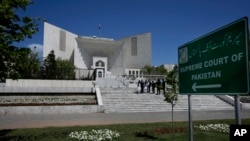Pakistan's Supreme Court lifted lifetime bans on politicians with past convictions from running for public office Monday, paving the way for former Prime Minister Nawaz Sharif to run in the national elections next month.
The top court announced the widely anticipated ruling after several days of hearings in a case that critics said was launched primarily to give relief to politicians allegedly backed by the powerful Pakistani military.
Prosecutors questioned the lifetime ban and argued that disqualification should be limited to the constitutionally mandated five-year term of the parliament.
Sharif was found guilty of corruption by the Supreme Court in 2017, forcing him to resign from the prime minister's office. A subsequent top court ruling banned for life Sharif and other public office holders convicted under constitutional clauses requiring lawmakers to be "honest and trustworthy."
The 74-year-old former leader was not an applicant in the lawsuit, but Monday's verdict makes him eligible to contest the February 8 elections and become the prime minister for a fourth time. His Pakistan Muslim League-Nawaz, or PML-N Party, is considered a front-runner to win the vote.
Sharif's main rival, former Prime Minister Imran Khan, has been imprisoned since last August after he was convicted and sentenced to three years in a graft case. Khan, 71, cannot contest the upcoming polls because his conviction led the country's election commission to ban him from national politics for five years.
The jailed cricket hero-turned-politician denies any wrongdoing and accuses the Pakistani military of engineering the toppling of his government last year and subsequently instituting frivolous lawsuits to block his return to power.
According to public polls, Khan's Pakistan Tehreek-e-Insaf, or PTI, is rated as the most popular political party, but it has been under a government crackdown for months. Dozens of senior PTI leaders remain in jail or in hiding to escape arrest, and their candidacies have also been rejected in violation of election laws, say party lawyers.
While Sharif's eligibility to contest the polls became effective only after Monday's Supreme Court ruling, critics noted that election officials had already approved his candidacy, turning down objections by his rival candidates.
Sharif was serving a 10-year sentence in 2019 when a court allowed him to leave jail and go to London for medical treatment for a few weeks, but he didn’t return to Pakistan.
He ended his self-imposed exile and returned to Pakistan last October after courts suspended his convictions, a move Khan alleges was the outcome of Sharif’s deal with the military. The PML-N and the military deny the charges.




